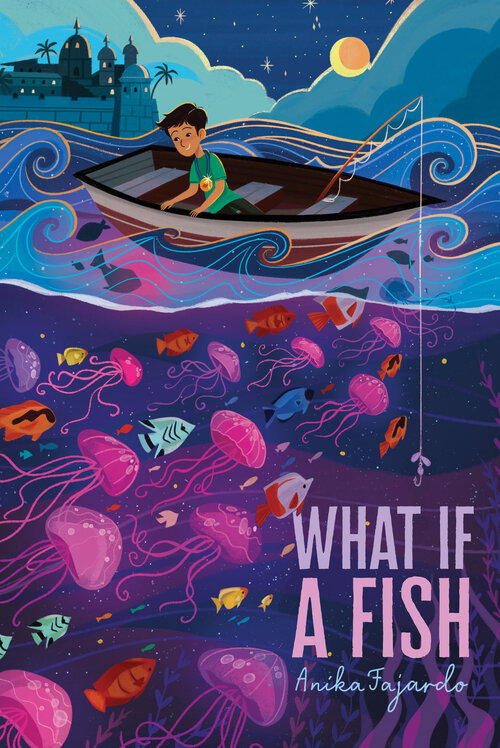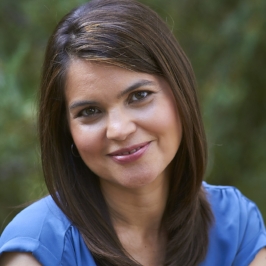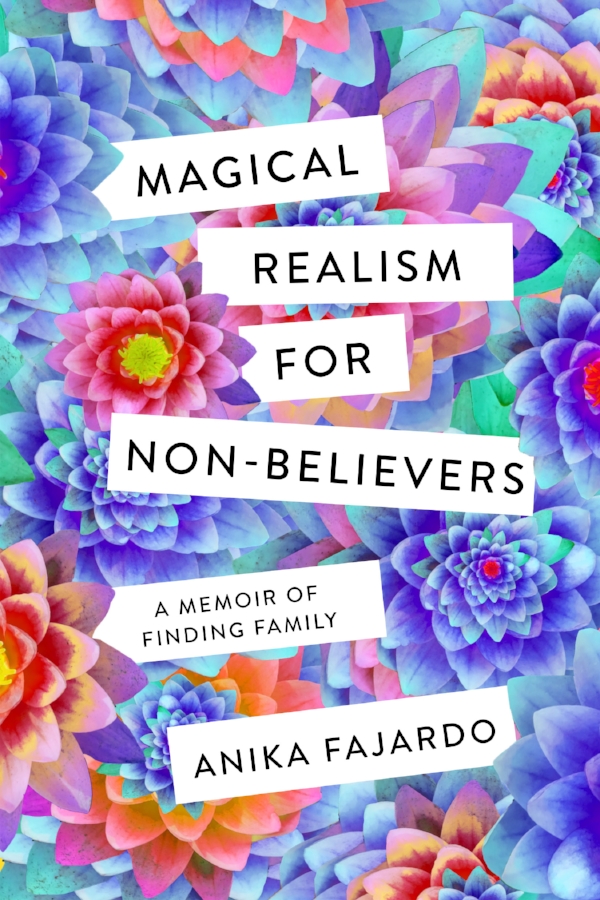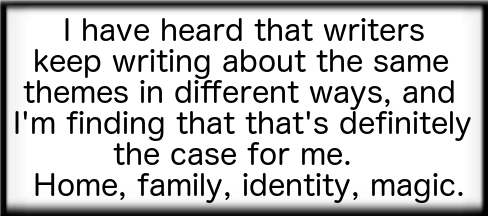
What a delightful debut middle grade novel! What If a Fish came out in 2020 from Simon & Schuster Books for Young Readers, and I’m thrilled that author Anika Fajardo is here today to tell us a bit about her writing process.
But before we get to the interview, you know the drill… I’m doing a giveaway! One lucky reader will win a copy of What If a Fish. Hop to the end of this post to sign up, then come back to learn some of Anika’s insights about magical realism and writing, writing, writing… The deadline to enter is Tuesday, June 15, 2021, at 11:59 PM.
A. B. Westrick: Anika, welcome to my blog!
Anika Fajardo: Thank you so much for inviting me!
ABW: I want to start with a line I loved in What If a Fish. While on an airplane, the main character, Eddie, thinks,
I bet not even a fish out of water feels the way I do. One minute I’m in Minnesota, the next I’m in South America, and now I’m thirty thousand feet in the air. I feel like I got caught and dropped into some guy’s bucket and then released into a new lake. (pg. 156)
What a great line! So first, I’m wondering this: since you were born in Colombia and raised in Minnesota, how much of Eddie is you and how much is fictional or based on other people?

AF: Thanks for your thoughtful question. I actually wrote What If a Fish while I was taking a break from trying to publish my memoir. I took what I think of as the “emotional core” of my own story and placed it in Eddie’s world.
Eddie Aguado is fictional, but I think his sensitivities are like mine in many ways. I was a fifth grade teacher in my first career, and I was thinking of some of the boys I taught. Eddie’s feelings of not belonging and wondering where he comes from very much mirror my own feelings as a kid. I grew up in a very white suburb of Minneapolis in the 1980s and was an anomaly both as a half-Colombian and as a child of a single mom.
ABW: I love how your “emotional core” comes through on the page. And is fishing an activity you love at your core? How did you come up with the many fishing metaphors you wove into the story? Do you do a lot of fishing, yourself?
AF: Ha! I hate to disappoint, but I greatly dislike fishing. I don’t even like to eat fish! However, the inspiration for the story came from an actual event: I watched a guy catch an enormous fish at the lake near my home in Minneapolis. And the fish actually did bite the guy. That scene got my imagination going. I didn’t set out to write a book with fishing metaphors, but fish and water are both so ripe for metaphor. It was fun to sprinkle those in!
ABW: And fun to read them!

Your book invites readers to question stereotypes such as the image used to sell Colombian coffee: a sombrero-wearing man with a donkey. Then there’s the scene where a dad puts Eddie down, saying, “I thought Colombians could play soccer” (pg. 68); also, there’s the fear of what might happen to Eddie’s brown-skinned half-brother if he were to get pulled over by a cop. The story isn’t about any of these issues, just as “fishing isn’t about fish” (pg. 224), but the issues appear, creating a safe space, so to speak, for kicking off conversations about identity, belonging, and acceptance. When you began writing, did you know you’d include these issues in the story? What was your starting point? Which scene did you write first?
AF: Because this story began with the “emotional core” of my own story, I knew I wanted to center the theme on identity. For mixed kids, identity is a strange beast because many of us may “pass” as part of the majority culture while we also have experiences that set us apart. I wanted to provide that space for Eddie to question these things.
The book started as an adult stand-alone short story that featured the older brother much more heavily. As I transformed it into a middle grade novel and focused more on the 11 year old, I wanted to show the differences between Eddie as a mixed kid growing up with a white mom and his brother who will end up being an immigrant in the U.S. Those stories are very different.

ABW: Yes, very different. Nice juxtaposition.
Now, let’s talk about the magical moments! You’ve also written a memoir titled Magical Realism for Non-Believers, and in What If a Fish, when others explain the magic to Eddie, saying things like, “In Colombia anything can happen… Magical things happening to real people or real things happening in magical ways…” (pgs. 87, 89), I think it’s pretty clear that you have non-believer-type readers in mind. Fact-loving Eddie pooh-poohs the magic, but slowly comes to embrace a sense of possibility. (Such a great story!)
So, tell me a bit about magical realism. Why is it considered a Latinx thing? What are non-believers missing? Why is it that in Colombia anything can happen? Can anything happen in Minnesota? I’m rambling here, haha! Help me out.
Magical Realism
AF: Magical realism is a literary device popularized by mainly Latin American writers like Gabriel Garcia Márquez. It was originally used as a tool to subversively protest colonialism and has its roots in the contrasts between the Spanish colonial culture (Catholicism, imposed societal norms) and indigenous and African culture (magic, religion, the earth, nature). This is why I believe magical realism is limited to Latin and South America (and other places with colonial histories or other conflicts) and is less apt to be found in Minnesota or the U.S.
ABW: This is so interesting! I’ve read Márquez’s One Hundred Years of Solitude and Love in the Time of Cholera (I love his writing!), but I didn’t realize magical realism was used as a tool to protest colonialism. That makes it quite different from European-American stories with magical moments sprinkled in. Now I want to reread Marquez with this new understanding.
AF: Yes, do! In the end, what it boils down to is that it’s a vital part of living to accept that magical things (things we don’t understand) will happen. And we get to decide how we react to the things that happen to us; there’s no right way to interpret life, just as there’s no wrong/right way to grieve. I wanted Eddie to come to embrace the unknowable in life.
ABW: And he does, and it’s a wonderful part of his story.
Along the way, I noted that a few themes emerge in What If a Fish. There’s the value of finding one’s homeland… of going home. There’s also the value of knowing your own history. Another theme is: “Life is something. One moment we’re dancing… and… the next moment, everything can change” (pg. 116). When you began writing this novel, did you know from the get-go that these would be your themes?
AF: Not at all! I intended to write a story about identity and dual cultures, but in the end, I wrote more about the idea of accepting life (which is also a major theme in my memoir).

I have heard that writers keep writing about the same themes in different ways, and I’m finding that that’s definitely the case for me. Home, family, identity, magic.
ABW: Yes, the same themes again and again… with new characters and new settings.
Now I have a question about gender. I’ve heard some writers say that they struggle to capture the heart of a character whose gender is not theirs, but I’m the opposite: I identify as female but love crafting main characters who are boys. These days there’s a lot of talk about the fluidity of gender and whether anyone would/should care one way or another, but in any case, my question is about process. Did you consider writing from a girl’s point of view instead of a boy’s? How did you come to decide to write this story from the perspective of an eleven year-old boy?
AF: Not only am I kind of a girly-girl, I’m an only child of a single mother and I have a daughter. I never would have imagined that I would write from a boy’s perspective. However, because the idea started with watching the guy catch a huge fish, the voice of Eddie popped in my head and wouldn’t go away. I decided to stick with his voice because he really wanted to tell his story.
When I was a teacher, there was a movement called Guys Read from Jon Scieszka, and I felt like it was really important to encourage boys to keep reading as they got into upper elementary. So that was definitely a motivation to stick with the boy character. Of course, I also had to add in a girl character, and I really love outgoing Cameron.
ABW: Yes, Cameron added some flair to the story!
Now, could you share a bit about how you get your writing done? Are you an early-bird or do you burn the midnight oil? Do you have rituals (such as lighting candles or listening to music) that help you focus?

AF: There was a time when I lit candles and had soft music, but now I just try to write when I have the time and am in the right mood. I am a great believer in naps; I take my laptop to bed in the afternoon and fall asleep. When I wake up (during those moments when you’re just becoming conscious) I’m able to write and to solve problems in my story. Plus, it’s a great excuse for a nap! If I’m on deadline, I take weekends away from my family. I rent a cabin or hotel room and just write and read and write and nap for three or four days. That’s when I get my best work done.
ABW: Okay, readers, did you hear that? A great reason for taking a nap! I love it.
Finally, what are you working on now?
AF: I just finished revisions for my next middle-grade novel. Meet Me Halfway will be out in spring 2022 from Simon & Schuster. It’s about half siblings again, but this time they’re sisters who are almost the same age. When they meet each other and discover their connection, they set off in search of their father, whom they’ve never met. It’s an adventure story, but it’s also about home, family, identity, and magic.
ABW: Oh, that sounds great.
Thank you again, Anika, for doing this interview and for writing such a great story! I look forward to reading your memoir as well as your next book.
AF: Thanks for your great questions. It’s always an honor when somebody reads your work closely.
ABW: I appreciate you saying that. I do enjoy reading closely!
AF: Well, it shows. Thank you again.
Readers who want to know more about Anika and her books can find her at Twitter, Instagram, Goodreads, and her website. If you visit, please let me know through the Rafflecopter below. Each entry earns you a chance to win a copy of What If a Fish.
The deadline to enter is Tuesday, June 15, 2021, at 11:59 PM. Multiple entries on multiple days are welcome. On June 16, I’ll ask the Rafflecopter to choose a random winner. Good luck!
